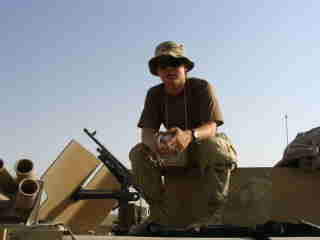having my guts ripped out by weasels.
Module One of this godawful online course had 17 pages.
Module Two had 27.
I just opened Module Three, and it has 46.
Fortunately, I can listen to the audio and blog, or play Minesweeper. Coherence may suffer, but I think we're all used to that.
You know, when I first got to Iraq, we had a truly bizarre safety requirement. We had to prepare one of the Army's whiz-bang composite risk management matrices before we rolled out.
There is, of course, a process for this. You first identify hazards. Then you assess the severity of the hazard. Then you identify controls to mitigate the risks, then you re-assess the risk's severity in light of the mitigation. Got it?
The process works alright in garrison.
Example: Vehicles are being driven to the fuel point.
Risk 1 is death of soldiers in vehicles as a result of collisions.
Risk 2 is running over innocent bystanders.
It is, we'll say, a moderate-risk activity (degree of risk is determined by a combination of likelihood and severity of possible damage).
We'll mitigate those risks by making soldiers wear helmets and seatbelts (risk 1) and using groundguides (risk 2)
Now it's a low-risk activity. Voila!
Not so well in a war. The daily discussion went something like this...
The first sergeant and the commander would stand around and look at a blank risk matrix. As the operations NCO, I would stand respectfully behind them.
Sir, Top would say, the risks are death, total loss of a vehicle, major injuries, and major vehicle damage.
The commander would nod and look annoyed, and the first sergeant would continue, peering at the matrix.
That's pretty likely, sir, and even if we say it's only kinda-likely, it's still all real severe.
That's where I'd make my contribution, saying, "but let's mitigate all that by wearing helmets!"
The commander would sigh, and the first sergeant would write slowly in the little blocks, trying to mitigate the risks.
Sir, he'd conclude, always with a properly sorrowful tone, we still have high risk of real bad shit.
I'd usually offer more helpful input. "Does that mean we can skip today's mission and go back to sleep and wait for peace to break out?"
And that was the part where the first sergeant would point out that it was an appropriate time for me to shut the hell up and take the pre-mission paperwork up to the TOC.
Enough story-telling! My course is now explaining Heinrich's Accident Causation Model. I best go pay attention. Maybe the Heisenberg Uncertainty Principle is next. That would be entertaining. And hard to put on a matrix....
26 February 2008
It's like...
Posted by Abby at 21:18
Labels: Military Madness, Whining
Subscribe to:
Comment Feed (RSS)

|